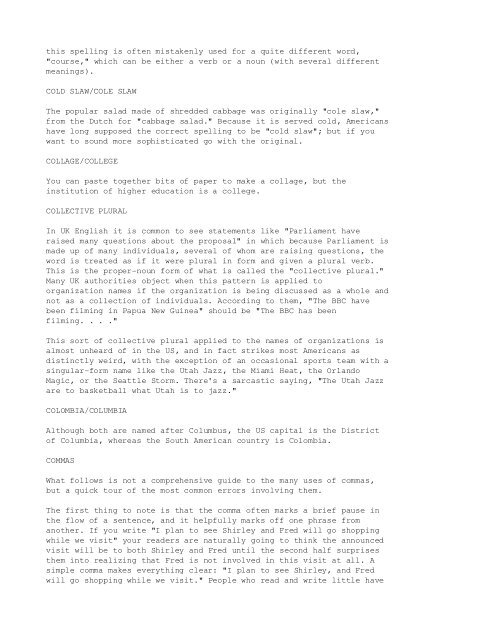Common_Errors_in_English_usage
Common_Errors_in_English_usage
Common_Errors_in_English_usage
Create successful ePaper yourself
Turn your PDF publications into a flip-book with our unique Google optimized e-Paper software.
this spell<strong>in</strong>g is often mistakenly used for a quite different word,<br />
"course," which can be either a verb or a noun (with several different<br />
mean<strong>in</strong>gs).<br />
COLD SLAW/COLE SLAW<br />
The popular salad made of shredded cabbage was orig<strong>in</strong>ally "cole slaw,"<br />
from the Dutch for "cabbage salad." Because it is served cold, Americans<br />
have long supposed the correct spell<strong>in</strong>g to be "cold slaw"; but if you<br />
want to sound more sophisticated go with the orig<strong>in</strong>al.<br />
COLLAGE/COLLEGE<br />
You can paste together bits of paper to make a collage, but the<br />
<strong>in</strong>stitution of higher education is a college.<br />
COLLECTIVE PLURAL<br />
In UK <strong>English</strong> it is common to see statements like "Parliament have<br />
raised many questions about the proposal" <strong>in</strong> which because Parliament is<br />
made up of many <strong>in</strong>dividuals, several of whom are rais<strong>in</strong>g questions, the<br />
word is treated as if it were plural <strong>in</strong> form and given a plural verb.<br />
This is the propernoun form of what is called the "collective plural."<br />
Many UK authorities object when this pattern is applied to<br />
organization names if the organization is be<strong>in</strong>g discussed as a whole and<br />
not as a collection of <strong>in</strong>dividuals. Accord<strong>in</strong>g to them, "The BBC have<br />
been film<strong>in</strong>g <strong>in</strong> Papua New Gu<strong>in</strong>ea" should be "The BBC has been<br />
film<strong>in</strong>g. . . ."<br />
This sort of collective plural applied to the names of organizations is<br />
almost unheard of <strong>in</strong> the US, and <strong>in</strong> fact strikes most Americans as<br />
dist<strong>in</strong>ctly weird, with the exception of an occasional sports team with a<br />
s<strong>in</strong>gularform name like the Utah Jazz, the Miami Heat, the Orlando<br />
Magic, or the Seattle Storm. There's a sarcastic say<strong>in</strong>g, "The Utah Jazz<br />
are to basketball what Utah is to jazz."<br />
COLOMBIA/COLUMBIA<br />
Although both are named after Columbus, the US capital is the District<br />
of Columbia, whereas the South American country is Colombia.<br />
COMMAS<br />
What follows is not a comprehensive guide to the many uses of commas,<br />
but a quick tour of the most common errors <strong>in</strong>volv<strong>in</strong>g them.<br />
The first th<strong>in</strong>g to note is that the comma often marks a brief pause <strong>in</strong><br />
the flow of a sentence, and it helpfully marks off one phrase from<br />
another. If you write "I plan to see Shirley and Fred will go shopp<strong>in</strong>g<br />
while we visit" your readers are naturally go<strong>in</strong>g to th<strong>in</strong>k the announced<br />
visit will be to both Shirley and Fred until the second half surprises<br />
them <strong>in</strong>to realiz<strong>in</strong>g that Fred is not <strong>in</strong>volved <strong>in</strong> this visit at all. A<br />
simple comma makes everyth<strong>in</strong>g clear: "I plan to see Shirley, and Fred<br />
will go shopp<strong>in</strong>g while we visit." People who read and write little have





